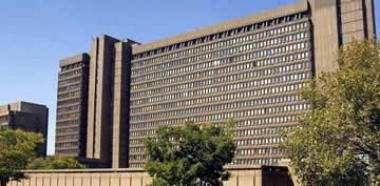City of Joburg sets aside R103m for office building upgrades
 The City of Johannesburg on Tuesday announced that R103 million had been set aside for the facelift and upgrading its council chambers office in Braamfontein.
The City of Johannesburg on Tuesday announced that R103 million had been set aside for the facelift and upgrading its council chambers office in Braamfontein.
In a budget presented by the City of Johannesburg finance manager, Geoffrey Makhubo, on Tuesday announced R103m had been set aside for the facelift and upgrading its council chambers office in Braamfontein.
It is part of R281m allocated to the office of the speaker of the council.
Mr Makhubo presented a budget of R47.1bn, which combines operational and capital expenditure.
Capital expenditure was allocated R10bn for the 2014-15 financial year and would include the construction of a bus rapid transit route on Louis Botha Avenue at a cost of R2.6bn. The Johannesburg Roads Agency would receive an operating budget of R814m to repair existing road infrastructure.
As of July 1, the provincial housing function would be assigned to the city. To better perform this function, the city received a grant from the provincial government of R59.5m to increase its capacity.
The city’s housing department has been allocated a three-year capital budget of R2.6bn.
The money is to be spent on the upgrading of existing informal settlements and development of the city centre, among other things.
The City of Johannesburg has 180 informal settlements, and 60 of them are expected to become formal urban settlements soon.
City Power was allocated an operating budget of R13.2bn to refurbish old infrastructure and build new infrastructure in areas including Rivasdale, Reuven, Berea, Ferndale, Lenasia and Halfway House. Alarms would be installed at power substations to deter cable theft.
Mr Makhubo announced that the city would issue new green bonds. This would help the municipality intensify its investment in green and sustainable projects. Johannesburg has to date redeemed R1.9bn in municipal bonds.
The council had improved its billing system and increased its collection rate to 92.5%.
Bad news for the residents is the decision to hike electricity tariffs 7.05%, giving the city R13.6bn in revenue. Water and sewerage tariffs would surge 8.9%. Registered indigent households would continue to receive free electricity, water and sanitation as stipulated in the metro’s extended social package.
Tariffs for waste removal services would increase 6% for domestic households and 8% for business and commercial customers.
Properties valued at less than R200,000 and registered indigent households would continue to receive free refuse removal services. Property rates would rise 5%, but pensioners with gross monthly household income of less than R7,000 and property values not more than R2m would get a 100% rebate, while those with gross monthly income higher than R7,000 but less than R12,000 qualify for a 50% rebate.
Residential sectional title rebate has dropped from 15% to 10%.
Meanwhile, Johannesburg residents would from September be able to lodge complaints about the city’s decisions. “The ombudsman is our local public protector,” Mr Makhubo said. “We have budgeted R40m for this office.”















